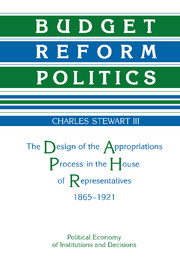 Budget Reform Politics
Budget Reform Politics Book contents
- Frontmatter
- Contents
- List of tables and figures
- Series editors' preface
- Acknowledgments
- PART I ISSUES IN THE STUDY OF BUDGETING
- Introduction
- 1 Understanding budgeting and budget reform in Congress
- 2 Setting the historical stage
- PART II SPENDING REFORM AND ITS CONSEQUENCES, 1865–1921
- PART III CONCLUSION
- Appendix: summary of budget reform attempts in the House, 1865–1921
- References
- Index
- Frontmatter
- Contents
- List of tables and figures
- Series editors' preface
- Acknowledgments
- PART I ISSUES IN THE STUDY OF BUDGETING
- Introduction
- 1 Understanding budgeting and budget reform in Congress
- 2 Setting the historical stage
- PART II SPENDING REFORM AND ITS CONSEQUENCES, 1865–1921
- PART III CONCLUSION
- Appendix: summary of budget reform attempts in the House, 1865–1921
- References
- Index
Summary
Those who have lived in the United States during the post-World War II era have witnessed a considerable amount of tinkering with the procedures Congress uses to appropriate public funds. Each decade seems to bring a structural fix for the budgetary problems that ail us. Four “reforms” in recent decades particularly stand out: the creation of a joint budget committee under the Legislative Reorganization Act of 1946, the experiment with an omnibus appropriations bill in 1950, the passage of the Congressional Budget and Impoundment Control Act (CBICA) of 1974, and the passage of the Gramm-Rudman-Hollings deficit reduction act in 1985. The shift of billions of dollars of expenditures away from the annual appropriations process toward “entitlement” and “backdoor” spending during the 1960s also counts as an important, if informal, alteration of congressional procedures. In addition to these procedural changes that have actually been enacted by Congress within the past generation, countless other schemes have been proposed to change the budgetary process even further, only never to get out of committee.
To most people, all of this tinkering (or tampering) is yet another indication of the increased complexity of our age. The necessity to deliver more government services to more people requires Congress to expand its institutional and analytical capacities. More people rely on government spending for their livelihoods, and both they and their representatives try to structurally shield spending of interest to them from close public scrutiny.
- Type
- Chapter
- Information
- Budget Reform PoliticsThe Design of the Appropriations Process in the House of Representatives, 1865–1921, pp. 3 - 12Publisher: Cambridge University PressPrint publication year: 1989


